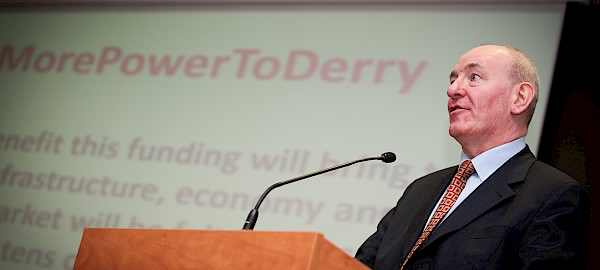 SDLP Foyle MP Mark Durkan has challenged calls to reduce the UK’s international aid budget during a Parliamentary debate at Westminster this week sparked by a Mail on Sunday petition.
SDLP Foyle MP Mark Durkan has challenged calls to reduce the UK’s international aid budget during a Parliamentary debate at Westminster this week sparked by a Mail on Sunday petition.
The e-petition, signed by more than 230,000 people, calls for the legal commitment to spending 0.7% of national income overseas to be scrapped – and proposes that aid money should instead be provided on a “case-by-case basis” and “only for truly deserving causes”.
Addressing a packed Westminster Hall this week, Mr Durkan said: “Like others, I am here because I have been contacted by a number of constituents, most of whom support the 0.7% commitment.
“Indeed, Foyle is the constituency where the sixth fewest people have signed the petition.
“In fact, of the constituencies with MPs who take their seats here, only the two small island constituencies represented by the right hon.
“Member for Orkney and Shetland and the hon. Member for Na h-Eileanan an Iar have had fewer signatories to the petition. That is because the city of Derry has always had an outward-looking approach, and the diocese of Derry has always made the highest per capita contribution to the annual Lenten collections for Trócaire, the Irish equivalent of the Catholic Agency for Overseas Development (CAFOD).
“People support the 0.7% contribution not just because, after many years, it is about time that we finally stepped up to meet that long-standing commitment, but because they know that such a commitment will, of itself, be transformative. Aid should not just be transactional; it should be transformational.
“The petition talks about instead taking action on a case-by-case basis. If we were to reduce aid by doing that, the situation would be impossible; the problems would far outstrip the solutions.
“There is a gear change that results from the sort of commitment that the UK has made – we would see that if we could get more governments to follow the UK’s excellent example – as we have seen in recent years with the commitment to the Global Fund to Fight AIDS, Tuberculosis and Malaria, which has made a big difference.
“Big differences have also been made on education; 20 years ago, one in 10 children died before they reached the age of five, and now that is down to one in 20.
“Of course, not only are more children reaching the age of five and going to school, but there are more schools for them.
“We need to do more. We should not be content to get more children, particularly girls, into education; we should move on to guaranteeing them 12 years of education. In responding to humanitarian crises, we should think about education, which is often one of the last things to be thought about because of all the other pressures and crises.
“Front-loaded commitments to a healthy level of predictable and sustainable aid can ensure that we make our commitment to the Sustainable Development Goals meaningful.
“We cannot meet our goals through intermittent top-ups. The Sustainable Development Goals need sustained aid at 0.7%,” added Mr Durkan.





